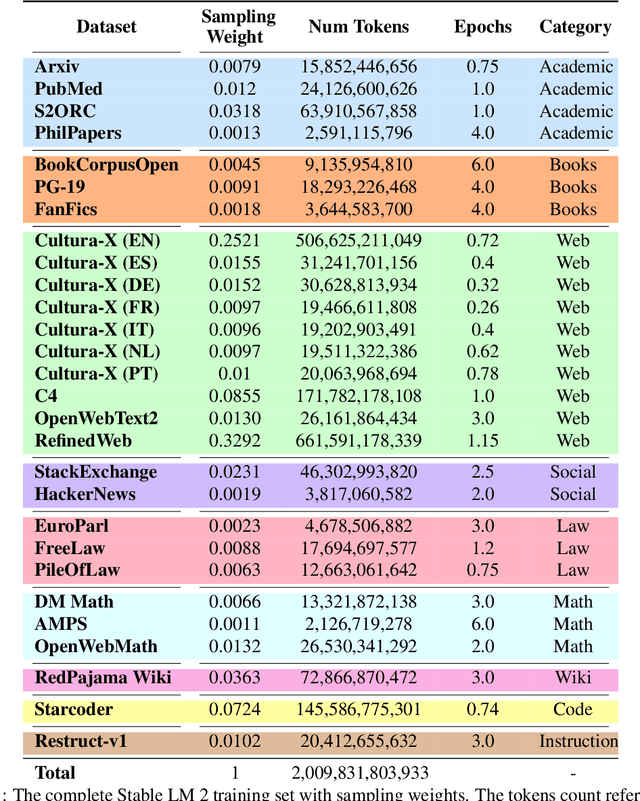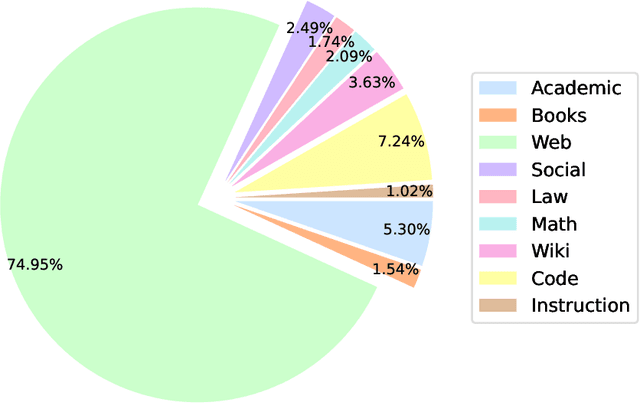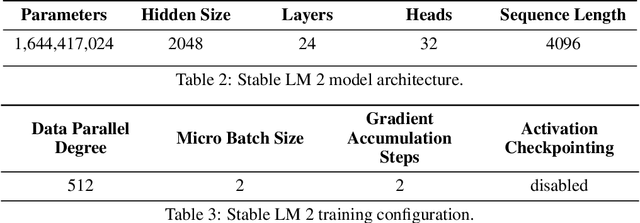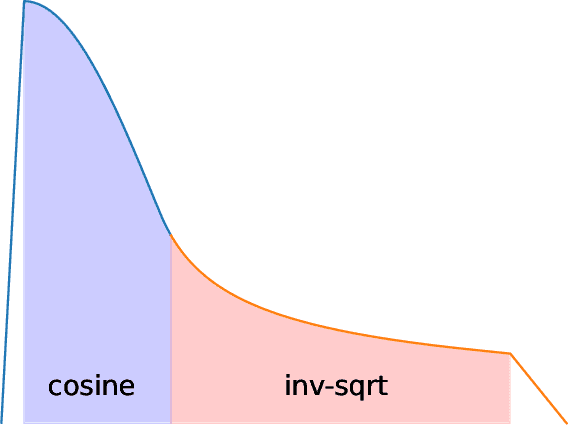Maksym Zhuravinskyi
Stable Cinemetrics : Structured Taxonomy and Evaluation for Professional Video Generation
Sep 30, 2025Abstract:Recent advances in video generation have enabled high-fidelity video synthesis from user provided prompts. However, existing models and benchmarks fail to capture the complexity and requirements of professional video generation. Towards that goal, we introduce Stable Cinemetrics, a structured evaluation framework that formalizes filmmaking controls into four disentangled, hierarchical taxonomies: Setup, Event, Lighting, and Camera. Together, these taxonomies define 76 fine-grained control nodes grounded in industry practices. Using these taxonomies, we construct a benchmark of prompts aligned with professional use cases and develop an automated pipeline for prompt categorization and question generation, enabling independent evaluation of each control dimension. We conduct a large-scale human study spanning 10+ models and 20K videos, annotated by a pool of 80+ film professionals. Our analysis, both coarse and fine-grained reveal that even the strongest current models exhibit significant gaps, particularly in Events and Camera-related controls. To enable scalable evaluation, we train an automatic evaluator, a vision-language model aligned with expert annotations that outperforms existing zero-shot baselines. SCINE is the first approach to situate professional video generation within the landscape of video generative models, introducing taxonomies centered around cinematic controls and supporting them with structured evaluation pipelines and detailed analyses to guide future research.
Arabic Stable LM: Adapting Stable LM 2 1.6B to Arabic
Dec 05, 2024Abstract:Large Language Models (LLMs) have shown impressive results in multiple domains of natural language processing (NLP) but are mainly focused on the English language. Recently, more LLMs have incorporated a larger proportion of multilingual text to represent low-resource languages. In Arabic NLP, several Arabic-centric LLMs have shown remarkable results on multiple benchmarks in the past two years. However, most Arabic LLMs have more than 7 billion parameters, which increases their hardware requirements and inference latency, when compared to smaller LLMs. This paper introduces Arabic Stable LM 1.6B in a base and chat version as a small but powerful Arabic-centric LLM. Our Arabic Stable LM 1.6B chat model achieves impressive results on several benchmarks beating multiple models with up to 8x the parameters. In addition, we show the benefit of mixing in synthetic instruction tuning data by augmenting our fine-tuning data with a large synthetic dialogue dataset.
Rephrasing natural text data with different languages and quality levels for Large Language Model pre-training
Oct 28, 2024



Abstract:Recently published work on rephrasing natural text data for pre-training LLMs has shown promising results when combining the original dataset with the synthetically rephrased data. We build upon previous work by replicating existing results on C4 and extending them with our optimized rephrasing pipeline to the English, German, Italian, and Spanish Oscar subsets of CulturaX. Our pipeline leads to increased performance on standard evaluation benchmarks in both the mono- and multilingual setup. In addition, we provide a detailed study of our pipeline, investigating the choice of the base dataset and LLM for the rephrasing, as well as the relationship between the model size and the performance after pre-training. By exploring data with different perceived quality levels, we show that gains decrease with higher quality. Furthermore, we find the difference in performance between model families to be bigger than between different model sizes. This highlights the necessity for detailed tests before choosing an LLM to rephrase large amounts of data. Moreover, we investigate the effect of pre-training with synthetic data on supervised fine-tuning. Here, we find increasing but inconclusive results that highly depend on the used benchmark. These results (again) highlight the need for better benchmarking setups. In summary, we show that rephrasing multilingual and low-quality data is a very promising direction to extend LLM pre-training data.
Stable Code Technical Report
Apr 01, 2024



Abstract:We introduce Stable Code, the first in our new-generation of code language models series, which serves as a general-purpose base code language model targeting code completion, reasoning, math, and other software engineering-based tasks. Additionally, we introduce an instruction variant named Stable Code Instruct that allows conversing with the model in a natural chat interface for performing question-answering and instruction-based tasks. In this technical report, we detail the data and training procedure leading to both models. Their weights are available via Hugging Face for anyone to download and use at https://huggingface.co/stabilityai/stable-code-3b and https://huggingface.co/stabilityai/stable-code-instruct-3b. This report contains thorough evaluations of the models, including multilingual programming benchmarks, and the MT benchmark focusing on multi-turn dialogues. At the time of its release, Stable Code is the state-of-the-art open model under 3B parameters and even performs comparably to larger models of sizes 7 billion and 15 billion parameters on the popular Multi-PL benchmark. Stable Code Instruct also exhibits state-of-the-art performance on the MT-Bench coding tasks and on Multi-PL completion compared to other instruction tuned models. Given its appealing small size, we also provide throughput measurements on a number of edge devices. In addition, we open source several quantized checkpoints and provide their performance metrics compared to the original model.
Teaching Large Language Models to Reason with Reinforcement Learning
Mar 07, 2024



Abstract:Reinforcement Learning from Human Feedback (\textbf{RLHF}) has emerged as a dominant approach for aligning LLM outputs with human preferences. Inspired by the success of RLHF, we study the performance of multiple algorithms that learn from feedback (Expert Iteration, Proximal Policy Optimization (\textbf{PPO}), Return-Conditioned RL) on improving LLM reasoning capabilities. We investigate both sparse and dense rewards provided to the LLM both heuristically and via a learned reward model. We additionally start from multiple model sizes and initializations both with and without supervised fine-tuning (\textbf{SFT}) data. Overall, we find all algorithms perform comparably, with Expert Iteration performing best in most cases. Surprisingly, we find the sample complexity of Expert Iteration is similar to that of PPO, requiring at most on the order of $10^6$ samples to converge from a pretrained checkpoint. We investigate why this is the case, concluding that during RL training models fail to explore significantly beyond solutions already produced by SFT models. Additionally, we discuss a trade off between maj@1 and pass@96 metric performance during SFT training and how conversely RL training improves both simultaneously. We then conclude by discussing the implications of our findings for RLHF and the future role of RL in LLM fine-tuning.
Stable LM 2 1.6B Technical Report
Feb 27, 2024



Abstract:We introduce StableLM 2 1.6B, the first in a new generation of our language model series. In this technical report, we present in detail the data and training procedure leading to the base and instruction-tuned versions of StableLM 2 1.6B. The weights for both models are available via Hugging Face for anyone to download and use. The report contains thorough evaluations of these models, including zero- and few-shot benchmarks, multilingual benchmarks, and the MT benchmark focusing on multi-turn dialogues. At the time of publishing this report, StableLM 2 1.6B was the state-of-the-art open model under 2B parameters by a significant margin. Given its appealing small size, we also provide throughput measurements on a number of edge devices. In addition, we open source several quantized checkpoints and provide their performance metrics compared to the original model.
GLoRe: When, Where, and How to Improve LLM Reasoning via Global and Local Refinements
Feb 13, 2024



Abstract:State-of-the-art language models can exhibit impressive reasoning refinement capabilities on math, science or coding tasks. However, recent work demonstrates that even the best models struggle to identify \textit{when and where to refine} without access to external feedback. Outcome-based Reward Models (\textbf{ORMs}), trained to predict correctness of the final answer indicating when to refine, offer one convenient solution for deciding when to refine. Process Based Reward Models (\textbf{PRMs}), trained to predict correctness of intermediate steps, can then be used to indicate where to refine. But they are expensive to train, requiring extensive human annotations. In this paper, we propose Stepwise ORMs (\textbf{SORMs}) which are trained, only on synthetic data, to approximate the expected future reward of the optimal policy or $V^{\star}$. More specifically, SORMs are trained to predict the correctness of the final answer when sampling the current policy many times (rather than only once as in the case of ORMs). Our experiments show that SORMs can more accurately detect incorrect reasoning steps compared to ORMs, thus improving downstream accuracy when doing refinements. We then train \textit{global} refinement models, which take only the question and a draft solution as input and predict a corrected solution, and \textit{local} refinement models which also take as input a critique indicating the location of the first reasoning error. We generate training data for both models synthetically by reusing data used to train the SORM. We find combining global and local refinements, using the ORM as a reranker, significantly outperforms either one individually, as well as a best of three sample baseline. With this strategy we can improve the accuracy of a LLaMA-2 13B model (already fine-tuned with RL) on GSM8K from 53\% to 65\% when greedily sampled.
 Add to Chrome
Add to Chrome Add to Firefox
Add to Firefox Add to Edge
Add to Edge